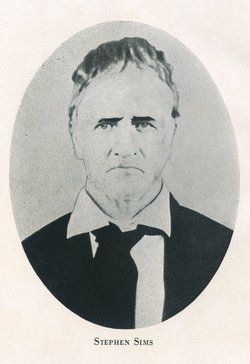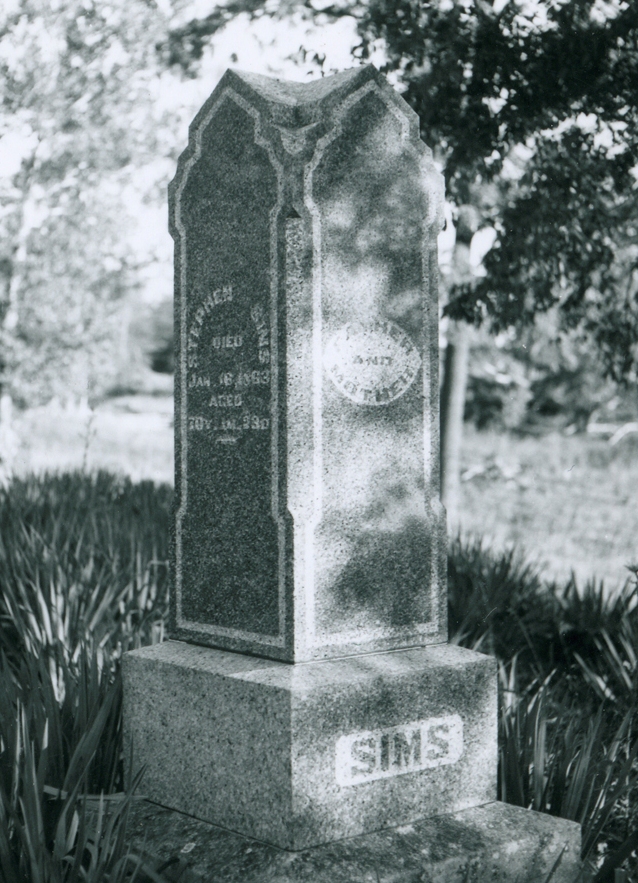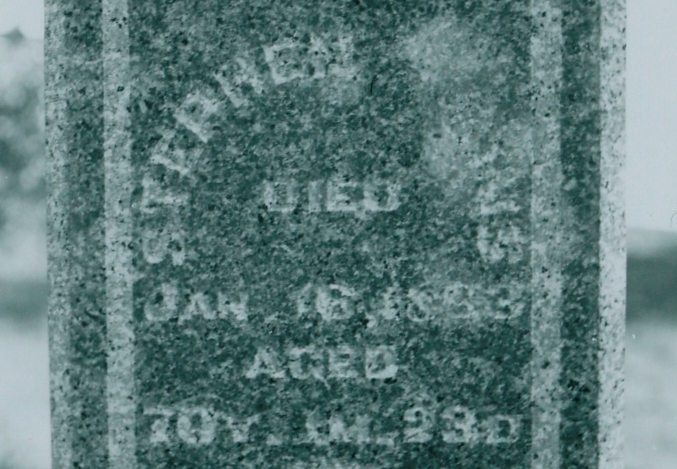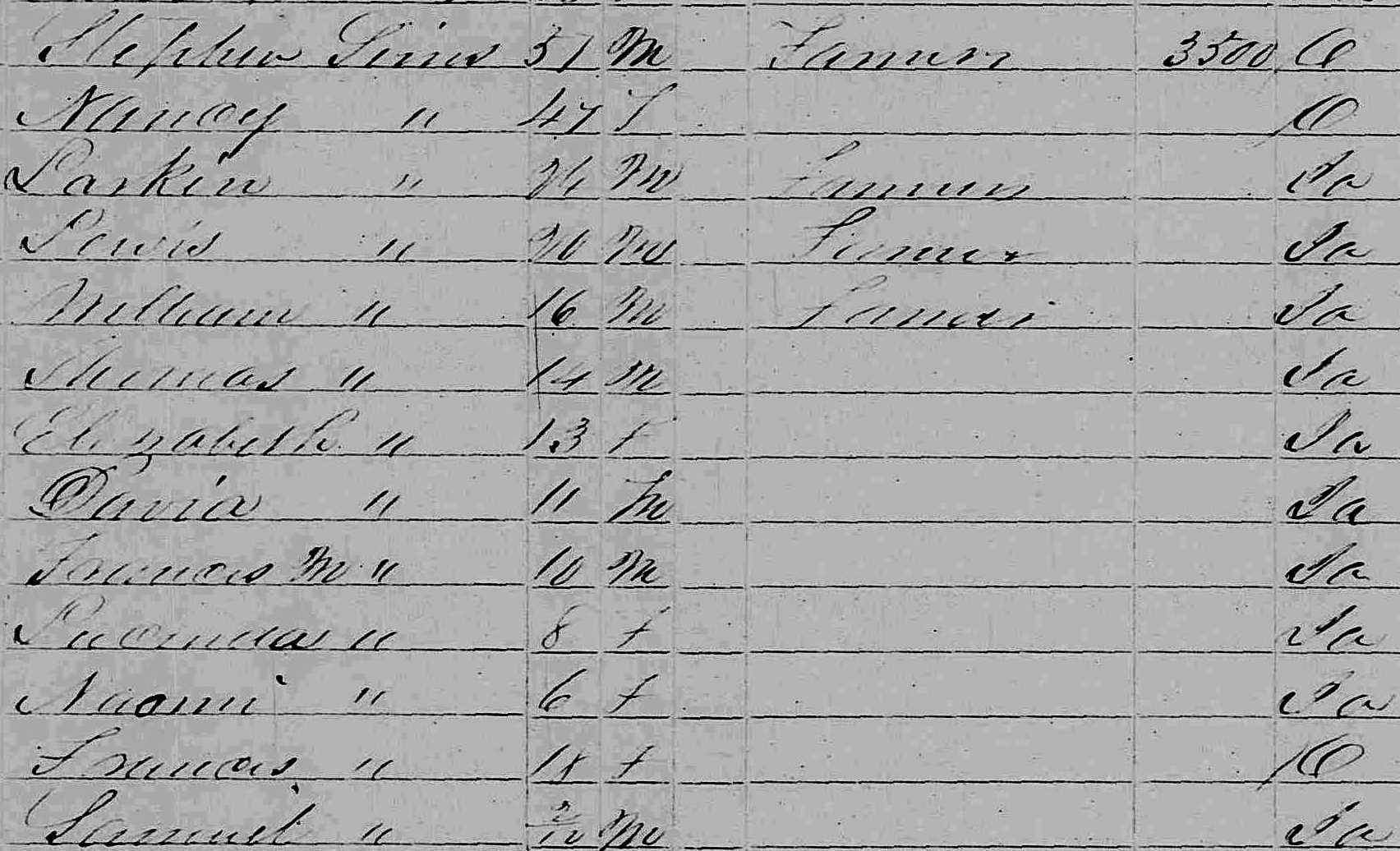1st wife: Elizabeth McCarty Sims (born 1797, Hamilton Co, OH; died 1834, Rush Co, IN; burial unknown)
2nd wife: Nancy Anna Creek Betts Sims (see link below)
Mother: Amelia Russell Sims (burial unknown)
Other children: In addition to the 13 children linked below, Stephen Sims was the father of the following other children (all by his first wife, Elizabeth) who didn't live long and whose exact burial places are unknown:
William Sims, born 18 Aug 1818 in Fayette Co, IN; died abt 1818.
Sarah Sims, born abt 1829; died 1832 in Rushville, Rush Co, IN.
Jesse Sims, born abt 1830; died abt 1832 in Rushville, Rush Co, IN.
====
From History of Clinton County, Indiana (Chicago: Inter-State Publishing Co, 1886), pp. 583-584:
Stephen Sims was born in Cocke County, Tennessee, November 24, 1792, died on his farm near Middle Fork, in Clinton County, Indiana, January 16, 1863. His father was a Revolutionary soldier, and a descendant of one of the early families of Virginia. In 1811, at the age of nineteen, he emigrated with is father's family from Tennessee to Indiana Territory, and settled in Franklin County, near Brookville. He was a soldier of the war of 1812, and served in the ranks with the late Judge Isaac Blackford, who was then a rising young lawyer of Brookville. He was first married in Franklin County, and afterward lived in Fayette, where he resided until January, 1821, when he removed with is family to the then lately erected county of Rush, and settled on a tract of land he had purchased from the Government near the present site of Rushville before that town was located. While living here, there being no county seat established, the records show the second term of Rush Circuit Court was held at his house. He was the first justice of the peace and second settler in Rushville, and acted a prominent part in the early development of that county. By trade a bricklayer and brickmaker, he assisted in that capacity in the erection of the first court-houses in the counties of Franklin, Fayette and Rush. He was the first school commissioner of Rush County, and while he held that office sold all the school lands in that county, and converted their proceeds into the common school funds, as then provided by law. In 1834 he removed to Boone County, and was the first appraiser of the taxable property of that county, preparatory to the taking effect of the ad valorem system of taxation. He was subsequently elected associate judge of that county, which office he held until he removed in April, 1836, to Clinton County. At the annual election in August, 1850, he was chosen a delegate to the ensuing constitutional convention from the counties of Clinton and Tipton, notwithstanding he was in affiliation with the political party in theminority in his district. This was the last office he ever held or sought, and it may be fairly said that he fulfilled the duties of all the offices with which he was intrusted with fidelity and efficiency. His early education was such as was attainable in the common schools of his day, which, however, he afterward improved by subsequent study, reading and observation. His political affiliations were with the Whig party until its dissolution, when he united with the Republican party, and continued to act with that party the remainder of his life. He was twice married, and was the father of a large family of children, thirteen of whom still survive, with numerous other descendants in different counties in Indiana and other States. And he had six sons and four grandsons in the National army during the war of the Rebellion. For many years he was a zealous opponent of the use of intoxicating beverages, and took an active interest in the advancement of the temperance reformation. He never attained wealth, but was always recognized as an influential, upright and useful citizen.
1st wife: Elizabeth McCarty Sims (born 1797, Hamilton Co, OH; died 1834, Rush Co, IN; burial unknown)
2nd wife: Nancy Anna Creek Betts Sims (see link below)
Mother: Amelia Russell Sims (burial unknown)
Other children: In addition to the 13 children linked below, Stephen Sims was the father of the following other children (all by his first wife, Elizabeth) who didn't live long and whose exact burial places are unknown:
William Sims, born 18 Aug 1818 in Fayette Co, IN; died abt 1818.
Sarah Sims, born abt 1829; died 1832 in Rushville, Rush Co, IN.
Jesse Sims, born abt 1830; died abt 1832 in Rushville, Rush Co, IN.
====
From History of Clinton County, Indiana (Chicago: Inter-State Publishing Co, 1886), pp. 583-584:
Stephen Sims was born in Cocke County, Tennessee, November 24, 1792, died on his farm near Middle Fork, in Clinton County, Indiana, January 16, 1863. His father was a Revolutionary soldier, and a descendant of one of the early families of Virginia. In 1811, at the age of nineteen, he emigrated with is father's family from Tennessee to Indiana Territory, and settled in Franklin County, near Brookville. He was a soldier of the war of 1812, and served in the ranks with the late Judge Isaac Blackford, who was then a rising young lawyer of Brookville. He was first married in Franklin County, and afterward lived in Fayette, where he resided until January, 1821, when he removed with is family to the then lately erected county of Rush, and settled on a tract of land he had purchased from the Government near the present site of Rushville before that town was located. While living here, there being no county seat established, the records show the second term of Rush Circuit Court was held at his house. He was the first justice of the peace and second settler in Rushville, and acted a prominent part in the early development of that county. By trade a bricklayer and brickmaker, he assisted in that capacity in the erection of the first court-houses in the counties of Franklin, Fayette and Rush. He was the first school commissioner of Rush County, and while he held that office sold all the school lands in that county, and converted their proceeds into the common school funds, as then provided by law. In 1834 he removed to Boone County, and was the first appraiser of the taxable property of that county, preparatory to the taking effect of the ad valorem system of taxation. He was subsequently elected associate judge of that county, which office he held until he removed in April, 1836, to Clinton County. At the annual election in August, 1850, he was chosen a delegate to the ensuing constitutional convention from the counties of Clinton and Tipton, notwithstanding he was in affiliation with the political party in theminority in his district. This was the last office he ever held or sought, and it may be fairly said that he fulfilled the duties of all the offices with which he was intrusted with fidelity and efficiency. His early education was such as was attainable in the common schools of his day, which, however, he afterward improved by subsequent study, reading and observation. His political affiliations were with the Whig party until its dissolution, when he united with the Republican party, and continued to act with that party the remainder of his life. He was twice married, and was the father of a large family of children, thirteen of whom still survive, with numerous other descendants in different counties in Indiana and other States. And he had six sons and four grandsons in the National army during the war of the Rebellion. For many years he was a zealous opponent of the use of intoxicating beverages, and took an active interest in the advancement of the temperance reformation. He never attained wealth, but was always recognized as an influential, upright and useful citizen.
Family Members
-
![]()
Amelia Russell Sims Zion
1814–1894
-
![]()
Rebecca J Sims Bradshaw
1815–1892
-
![]()
Capt James Noble Sims
1817–1899
-
![]()
John F. Sims
1819–1883
-
![]()
Cicero Sims
1822–1913
-
![]()
Mary Jane Sims Ritchie
1824–1894
-
![]()
Larkin Sims
1825–1851
-
![]()
Capt Lewis Sims
1830–1913
-
![]()
Martha Ann Sims Sims
1832–1913
-
![]()
Capt. William Strange Sims
1834–1888
-
![]()
Capt. Thomas L. Sims
1835–1909
-
![]()
Elizabeth Sims Boggs
1836–1893
-
![]()
David C. Sims
1838–1863
-
![]()
Francis Berrien "Frank" Sims
1840–1904
-
![]()
Lucinda Irene Sims Smith
1841–1893
-
![]()
Naomi Caroline Sims Brooks
1844–1945
Advertisement
Advertisement


































